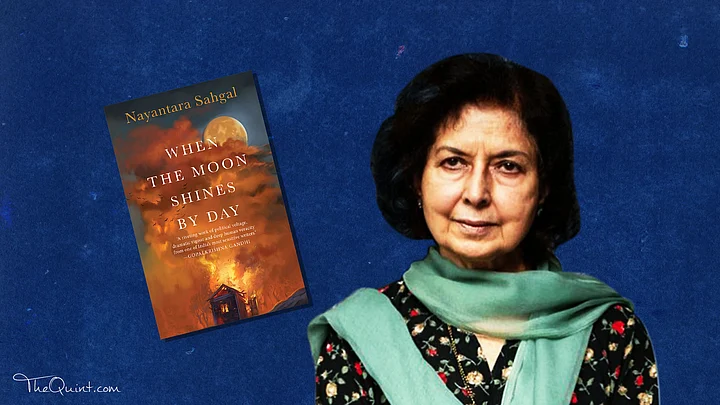“Because people are tortured for refusing to agree the moon shines by day and the sun by night….”
This one sentence, buried deep within the book, explains why the particular title was picked by Nayantara Sahgal for her latest offering When the Moon Shines By Day. The sentence pops up exactly halfway through the novella, at which point you’ve already given it up to be an obtuse abstraction with no real connect to the story. This, however, couldn’t be farther from the truth.
The sentence does a number of things at once.
One, it establishes a baseline for the bizarreness that the book constantly tries to juxtapose things against. (Something on the lines of “How could anyone possibly torture someone for refusing to agree to that the moon shines by day? Do people really do that?...”)
Two, it’s a powerful allegory.
And finally, it makes a strong political statement.
Because that is what Nayantara Sahgal truly does, throughout the book, unabashedly, unflinchingly.
Too caught up to read? Listen to the story:
My novella describes what is happening in India under our present political environment, which is alien to Indian values. So this book is about the unmaking of India.Nayantara Sahgal to The Quint
“Being Anti-War... is Blasphemous”: Line From the Book
Sahgal’s novella, simply put, is a mirror to everything that is viewed as a fault-line in our democracy today: violence against Dalits, discrimination against Muslims, censorship of literature, et al.
The story revolves around one protagonist, Rehana, who – the author is quick to tell us – has a name born out of no particular religion.
Rehana had grown up believing their interwoven Hindi-Urdu-English was one and the same entrancing language. They had named her Rehana because they liked the sound of it. Like their language, their world had no frontiers either.When The Moon Shines By Day
She is also revealed, halfway through the book, to be working for a humanitarian organisation called ‘Asians Against Torture’, which helps people irrespective of caste, creed, race or religion.
Right at the outset, then, Rehana is established as an almost idyllic person who, as the novella seems to suggest, has become hard to emulate in the India of When The Moon Shines By Day. Was the creation of this person deliberate? Says Sahgal:
Rehana is an Indian brought up in freedom, in a secular republic where religion is a private affair and all Indians are equal regardless of caste, creed etc. There are millions like her. Her humanitarian work started as a need to be occupied, and grew into a passion for justice and mercy.
As you read Sahgal’s novella, a desperate want for justice – some semblance of justice – aches at your insides. Surely, this can’t be right? How could they have killed the boy of the old flowerpot vendor? ‘They’ – eight men with long rods – kill a little Dalit boy, shouting “what leather is this, is this suitcase made of cowhide”? Surely, someone would have stopped them…surely, they could not have been this barbaric? Killed for caste?
A Muslim romantic interest of Rehana’s tells her, in casual conversation, how he had been asked to leave his old apartment:
My landlord demanded my apartment back. He said the other tenants wanted me out and it was best for my safety as well as his own. No one would rent me another. Finally I had to move a long way out.When The Moon Shines By Day
Surely, ‘the others’ saw the injustice in that?
When an enthusiastic young scholar called Kamlesh has his book threatened with a ban, you sit up uncomfortably, squirming at the eerie mirroring of reality. This isn’t just verisimilitude; this is real life. As his publisher Sudhir tells him:
(Your book) makes you out to be a pacifist. And that’s not allowed nowadays… Being anti-war has always been dangerous. But now, my friend, it’s blasphemous.When The Moon Shines By Day
“Dissent Has Not Been Cowed Down"
What does the author of this author think of such censorship, a familiar phenomenon today?
Dissent is vital to a democracy and to a sane society. Debate and dissent have been part of Indian civilisation since ancient times. Independent India gave us freedom of speech and thought and worship. We will not allow these to be crushed.Nayantara Sahgal
The talk of dissent and debate leads us to the horrific killing of veteran journalist and activist Gauri Lankesh and the vehement protests that have erupted – something, that Sahgal believes, has only strengthened the rightful voice of dissent…
Dissent has not been cowed down. Gauri Lankesh’s killing – coming after other killings – has led to huge protests all over the country. Indians will continue to defy those who want to snuff out our freedoms.
Also Read: ‘Gauri Lankesh Didn’t Kill You For Your Opinion, Why Did You?’
Sahgal’s book doesn’t end optimistically. Towards the end, you see an uneasy group of like-minded people gathering around a table to wine and dine, almost as if they’re waiting with bated breath, for things to get worse. Sahgal agrees:
Yes, the book ends on a note of foreboding. We already see happening much that should not be happening. This does not augur well for our future.
Perhaps the written word will get us through. Sahgal’s novella is living proof of its might.
(At The Quint, we question everything. Play an active role in shaping our journalism by becoming a member today.)
